Learn about what service dogs can do, and what it takes to certify and protect them
Published in Slideshow World
Subscribe
Learn about what service dogs can do, and what it takes to certify and protect them
Some dogs are more than man's best friend. Service dogs perform critical functions to keep their owners safe, healthy, and independent.
Also called "assistance dogs," these specially trained animals perform critical daily tasks for owners who have mobility, sensory, psychiatric, and developmental disabilities. While laws surrounding service animals have evolved over time and vary across states—South Dakota, for example, is the only state that does not have a prescribed definition of a service dog—these canines typically support a person with a disability, enhancing their independence and quality of life.
Emotional support dogs are not the same as service dogs because they do not have formal behavioral training to perform specific tasks. As of 2020, emotional support animals no longer qualify as service animals, marked by a revision to the Air Carrier Access Act of 1986 by the Department of Transportation. This rule limited the designation of service animals to dogs that perform tasks for owners with disabilities only, revoking privileges given to those that provide only emotional support.
Under this designation, therapy dogs are also categorized separately from service dogs. Though usually trained to interact with people, therapy dogs don't perform specific essential tasks and provide more generalized support and comfort. They also usually serve people other than their owners, who can register them to visit people in institutions like hospitals, care facilities, and schools.
For those looking to certify a service dog, there are various considerations to keep in mind, including legal standards. First, it's important to note that as of 2011, only dogs qualify as service animals under provisions of the Americans with Disabilities Act, though similar protections have been extended to trained miniature horses.
Ollie used data from the Animal Legal and Historical Center to examine requirements for certifying and using a service dog and further explore how service dog laws differ among states.
Visit thestacker.com for similar lists and stories.
What are some of the ways that service dogs can assist their owners?
Some service dogs are trained to support specific needs, such as a guide dog who provides sensory assistance to an individual who is blind. Seizure-alert dogs, for example, are trained to assist people with epilepsy and other conditions. They can prevent injuries during seizures by placing their bodies between their owner and the floor to break their fall. They can also be trained to activate a device that alerts the owner when the dog senses an upcoming seizure.
Besides supporting the needs of people with disabilities and other challenges, service dogs can actually aid in reducing symptoms, according to afirst-of-its-kind study funded by the National Institutes of Health and published in 2024. Veterans with post-traumatic stress disorder who have service dogs experience lower symptom severity and higher quality of life, according to the report.
Service animals can also help reduce social anxiety and prompt more social interactions, improving self-esteem by increasing feelings of independence. A 2017 survey published in the Health Quality Life Outcomes journal found that service dogs can increase their owners' engagement in recreational activities by boosting ability and enjoyment.
Licensing laws
- Number of states with such a law: 24
Licensing laws refer to registration requirements, fee exemptions, or a combination of the two. Getting a license for a service dog in California, Maine, Ohio, and other states requires a signed affidavit and certifications while also granting fee exemptions. In California, for example, owners without proper documentation can face six months' jail time, a $1,000 fine, or both.
Other states across the country mandate that people with disabilities who use service dogs are exempt from paying licensing fees. In some states like Rhode Island and Washington, towns are not required to offer fee exemptions but often honor requests to waive fees.
Service dog-in-training laws
- Number of states with such a law: 47
Service dog-in-training laws provide the same accommodation rights and privileges to people who are actively training service dogs regardless of whether they have a disability. Many states also hold the trainer liable for damages to premises done by the service dog in training.
Some states, like California, North Dakota, Oklahoma, and Tennessee, specify that the trainer must hold particular permissions to be allowed to take the dog in training to public locations without facing fees or restrictions.
Service dog fraud laws
- Number of states with such a law: 35
A person who willfully misrepresents an unregistered dog as a service dog or claims to need one to get the same benefits as a person with a disability is in violation of a service dog fraud law.
Alabama, Arizona, Arkansas, California, Colorado, Florida, Idaho, Iowa, Louisiana, Michigan, Nevada, New Hampshire, North Carolina, and South Carolina also specifically mention that people claiming to be trainers of service dogs or falsely identifying a dog as a service dog in training are also in violation.
The offense amounts to a class A misdemeanor in Kansas. The penalty for such a crime is up to $1,000 in Kentucky and Maine. It can include imprisonment in California, Michigan, and West Virginia or feature community service in Alabama, Florida, Michigan, Montana, Rhode Island, and Texas.
Public accommodation laws
- Number of states with such a law: 50
Thanks to public accommodation laws, businesses can't prohibit people with service animals from entering or charge a fee for the service animal.
All 50 states have a public accommodation law, but details vary. For example, Arizona makes exceptions for zoos and similar places with wild animals that the service dog could directly contact. A few states, namely Connecticut, Mississippi, and Virginia, require that the service dog be identified with an orange leash.
Denial of such rights can result in penalties up to $2,000 in Georgia; imprisonment in Georgia, Louisiana, Mississippi, Rhode Island, and South Carolina; or community service in Florida and Texas.
These laws ensure people with disabilities are granted equal access to all areas under the Americans with Disabilities Act.
Harassment or interference laws
- Number of states with such a law: 45
Harassment or interference laws prohibit people from interfering with the duties of a service dog. For example, in Arkansas, interference law only applies when a service dog is intentionally killed or injured; Illinois and North Carolina law expands the definition to include taunting and teasing.
Penalties for violating harassment or interference laws fluctuate as well. In Arizona, exerting "unauthorized control" over a service animal is animal cruelty and a class 6 felony. In South Carolina, it's a misdemeanor, and in Washington, it's first-degree theft.
In Pennsylvania, Rhode Island, Tennessee, Wisconsin, and Wyoming, the law holds accountable an owner of a dog that attacks a service dog to the extent it results in injury or death. Only five states—Alabama, Alaska, Iowa, Montana, and West Virginia—do not have harassment or interference laws.
Driving laws or 'White Cane Laws'
- Number of states with such a law: 49
Driving laws, or "White Cane Laws," require drivers approaching a pedestrian with a disability to yield the right of way. The white cane, used by people who are blind and those with visual impairments, is a symbol of independence. These laws also apply to people with other disabilities and those who use service dogs, encouraging their equal participation in society.
The laws hold drivers liable for any injuries the pedestrian suffers if struck. Alaska, Arizona, Louisiana, Maine, and Missouri laws specifically state that the driver is liable for any injury to the service dog as well.
Delaware also requires that drivers honk their horns to alert a person with a disability to their presence. In California, Hawai'i, Idaho, Mississippi, Nevada, Oklahoma, and South Carolina, failure to yield the right of way to a pedestrian with a white cane or service dog can result in imprisonment. Connecticut is the only state that does not have a driving law.
Story editing by Mike Taylor. Additional editing by Alizah Salario and Elisa Huang. Copy editing by Kristen Wegrzyn.
This story originally appeared on Ollie and was produced and distributed in partnership with Stacker Studio.


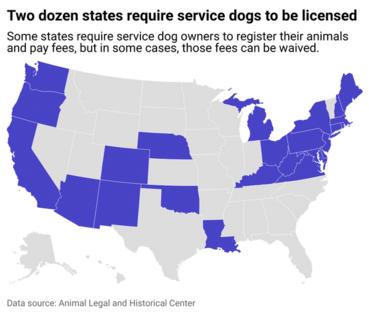
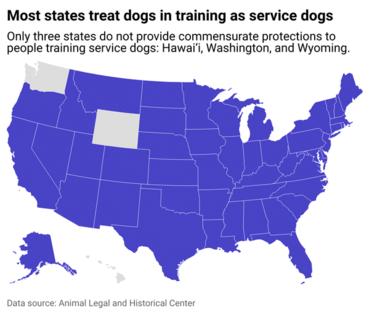
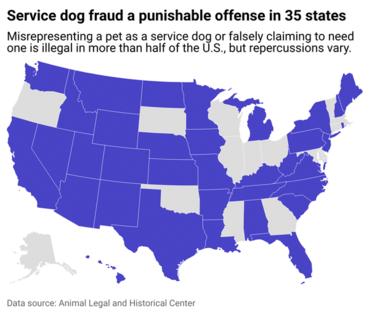
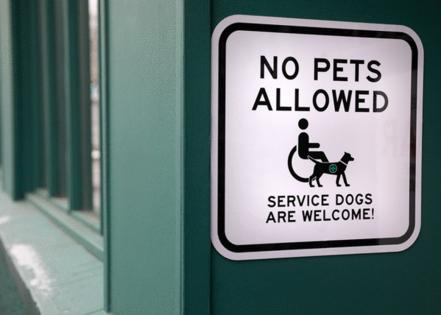
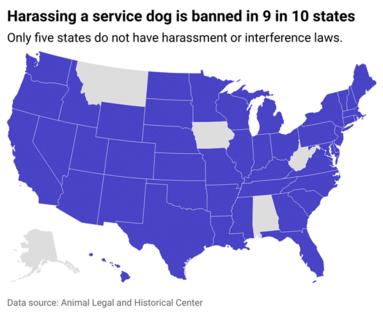
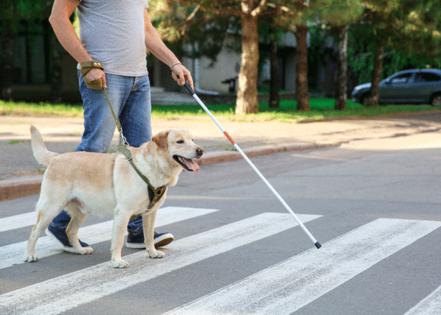






Comments